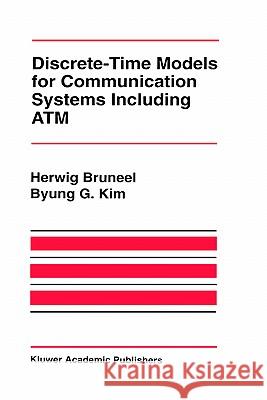Discrete-Time Models for Communication Systems Including ATM » książka
Discrete-Time Models for Communication Systems Including ATM
ISBN-13: 9780792392927 / Angielski / Twarda / 1992 / 200 str.
Most queuing analyses performed in the literature are based on characterization of queueing phenomena in continuous-time items. Recently in the telecommunication industries, BISDN (broadband integrated services digital network) has received considerable attention since it can provide a common interface for future communication needs including video, data, and speech. Since information in BISDN is transported by means of dicsrete units of 53-octet ATM (asynchronous transfer mode) cells, interests in discrete-time systems have increased.
Discrete-Time Models for Communication Systems Including ATM provides a general framework for queueing analyses of dicrete-time systems. After a brief look at past studies of discrete-time systems, a detailed description and analysis are presented for a generic discrete-time model with a single server, arbitrary service times and independent arrivals. The book then follows a less stringent approach and focuses more on the average statistics and on different queueing disciplines. Conventional first-in-out and last-in-first-out disciplines are discussed in terms of the average statistics. Systems with multiple classes of messages without class-dependent priorities are considered to establish a discrete-time conservation law. Multiple classes with priorities are also considered to derive performance measures of priority scheduling disciplines. Finally, a multi-queue system with cyclic service is analyzed in the context of round-robin service ordering.
This is followed by analyses of discrete-time queueing systems with more complicate' input and output processes. Specifically, single-server systems are investigated whereby either the arrivals or the server is subject to random interruptions. Results are mainly obtained in terms of generating functions and mean values of the principal performance measures. The influence of the nature of the arrival correlation and the server interruptions on the queueing behavior is discussed. Finally, the book explores queueing models directly associated with ATM switches and multiplexers.
This book is a valuable reference and may be used as a text for and advanced course on the subject.











